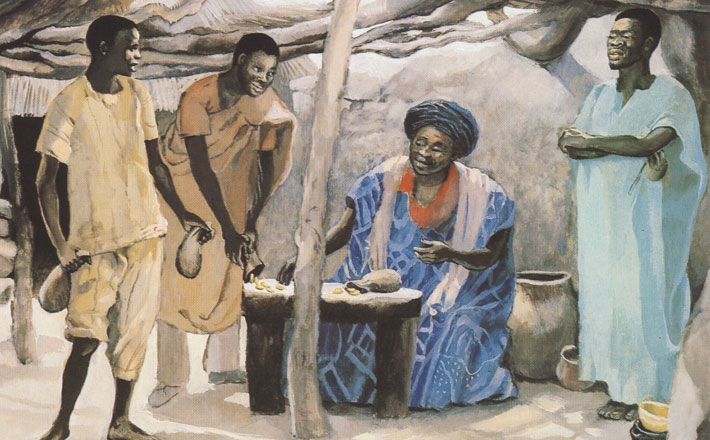Commentary on Judges 4:1-7
These seven verses are an introduction to the larger story of Deborah, Barak, and Sisera, and to the larger themes in the book of Judges.
In particular, this text introduces the theme of how God responds to — and works through — humans. As an introduction, this lectionary selection leaves out quite a bit of the larger story, but the raw material is present.
The book of Judges can be characterized by a repeated cycle, as follows: the Israelites do evil and abandon God, so God delivers them into the hand of foreign leaders who oppress them. Then, the Israelites cry out to God, who hears their cry and raises up a judge to deliver them. The judge — also a military leader — is successful, and the Israelites enjoy peace, but when the judge dies the people forget about following God, and the cycle begins again. This cycle can also be traced as a downward spiral in the book, with the final chapters describing a situation of complete moral chaos and civil war.
Deborah’s story occurs toward the beginning of the book, when things are not yet so bad in Israel. We are told three things about Deborah in 4:4: first, she is a prophet, second, she is married, and third, she is a judge. The New Living Translation changes the order from the Hebrew so her married status is the first thing mentioned about her, maybe to highlight that as first in importance. But some have argued that she is not even married at all.
The Hebrew expression, “wife of Lappidoth” could also be “woman of Lappidoth,” referring to where she comes from. Or, that phrase could be a description of Deborah’s character; the word “lappidoth” means “torch,” or “lightning,” so Deborah could be a “fiery woman.” In contrast to the potential ambiguity about Deborah’s marital status, her roles as prophet and judge are clear. And while the judges were leaders, mostly in military battles, Deborah is also a judge in the sense of adjudicating disputes, according to 4:5.
In fact, exactly who is the judge in this story may be up for dispute. Though Deborah is described as “judge,” she seems to be functioning more in the legal world than the military one, and she is the first — and only — female judge in the book. Barak seems to be another possible contender for the role when his name is mentioned in 4:6 and Deborah tells him the command of the Lord, to go forth and fight.
Deborah clearly speaks for God, as is indicated by the direct quote in verses 6-7. The lectionary ends with the promise that God will give the Canaanite general, Sisera, into Barak’s hands. This selection, however, leaves out Barak’s response to Deborah in verse 8, saying, “If you go with me, I will go, but if you will not go with me, I will not go.” Deborah answers in verse 9 by telling him that she will go, but Barak will not gain glory because God will have a woman defeat Sisera.
Some suggest that Barak so respects Deborah’s leadership that he is loath to venture forth without her at his side. Others believe that Barak is placing conditions on God’s call, or at least, indicating his fearfulness. Deborah’s response is then seen as a rebuke, and that God will “deliver Sisera into the hand of a woman” is seen as a punishment. Of course, that woman will not be Deborah, as would be natural to expect, but Jael the wife of Heber the Kenite, about whom little else is known.
Again, while the larger story obviously continues beyond where the lectionary selection ends, two things in these seven verses are noteworthy. First is how God responds to people’s actions. The first two verses in the chapter narrate it almost in a matter-of-fact way, “The Israelites again did evil in the Lord’s eyes … so the Lord sold them into the hand of King Jabin in Canaan … ” God does not ignore what God’s people do. And, God does not arbitrarily punish them. Their oppression by the Canaanite king is because they did evil, and God responded.
God also responds to the people’s cries in verse 3. At first, this may seem indirect, especially when contrasted with the people’s action in verse 1, and God’s response — when God is the subject — in verse 2. After the people cried out to the Lord, we have to wait through verses 4-5, with their descriptions of Deborah, before God again is the subject in verse 6, commanding through Deborah what Barak is to do. But this, too, is how God acts: in response to cries for help by speaking and working through other people. And again, in this story, God works not only through one person but three — Deborah, Barak, and Jael — to deliver God’s people.
The second noteworthy point in this lectionary selection is God’s use of a woman to lead the Israelites. Deborah is the only female judge, and she is also a prophet. She hears and speaks for God. The gospel lesson for today is the parable of the talents, in Matthew, where Jesus warns against burying a gift that God has given. Deborah is an example of someone who seems to put her gifts to work in surprising, creative, and inspiring ways.


November 16, 2014